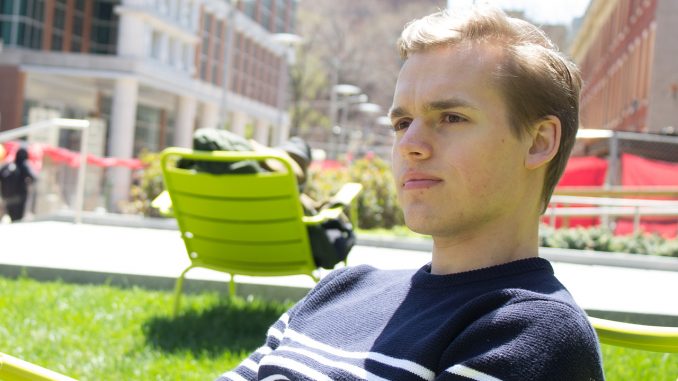
When Marcus Forst found out he won the Goldwater Scholarship, his reaction was similar to the one he had when he watched the Philadelphia Eagles win Super Bowl LII.
“Instead of feeling euphoria, I just felt shock and numbness,” said Forst, a junior physics major who won the award at the end of March.
The Barry Goldwater Scholarship and Excellence in Education Foundation was created by Congress in 1986 in memory of Arizona Sen. Barry Goldwater. The prestigious award, which has a value of up to $7,500, is for sophomores or juniors who plan to pursue a career in the STEM field.
Forst is the first Temple student to receive the Goldwater Scholarship.
Forst found out he won on March 30 after he entered the Honors Lounge to meet Barbara Gorka — the director of scholar development and fellowships advising — and was surprised by Jim Napolitano, the chair of the physics department, Michael Klein, the dean of the College of Science and Technology and all of the professors who had written him letters of recommendation for his Goldwater application. They were there to celebrate Forst winning the award.
“Just having them be very, very happy for me, that was great,” Forst said. “That’s one of my favorite moments.”
The Goldwater Scholarship application requires three essays: a personal essay, an essay explaining the applicant’s motivation to work in STEM and an essay explaining research an applicant has done or would like to do.
In his research essay, Forst wrote about how he’d like to study non-Joulian magnets, a new class of magnets that experience a large volume change when placed in magnetic fields, unlike other magnets. Non-Joulian magnets can also convert energy with minimal heat loss. He wants to study them through a scanning-tunneling microscope, an instrument for creating three-dimensional images of samples at an atomic level.
Forst has studied non-Joulian magnets in the past. He first worked in mechanical engineering professor Harsh Chopra’s laboratory researching the magnets from 2015-16.
In Fall 2017, Forst got experience with the scanning-tunneling microscope — an advanced microscope that not many universities have — by working in the lab with physics professor Maria Iavarone.
“I couldn’t think of another person that is more deserving [of] this award than Marcus for many different reasons,” Iavarone said.
Forst said being Temple’s first Goldwater scholar and gaining recognition for his research is one of his proudest moments.
“It’s something that I can be proud of because it represents the work that I’ve put in over the totality of my time at Temple,” Forst said.
After Forst was surprised by his professors with the information that he won the Goldwater Scholarship, he went on to teach a peer recitation in physics later that day, just like he does each Wednesday and Sunday with the Temple University Physics Club.
He started the peer recitation for the club this semester after seeing physics majors who had finished Physics I and II struggle in upper-level courses.
“My reasoning was that these students clearly aren’t dumb because they can and have done very well in Physics I and II, but there are certainly less resources for these upper-level classes,” Forst said. “There are office hours, but there often aren’t recitations, and so my goal was just to provide more resources.”
The funding from the award will save Forst time, he said, as he won’t have to keep a job to support his living costs. Instead, Forst will be able to focus on his research with Iavarone and his classes next semester.
In addition to balancing his classes and research this semester, Forst attends rock climbing competitions with the Temple Climbing Club, manages the men’s basketball team and receives chemotherapy once every four weeks to treat T-cell lymphoblastic lymphoma, which he has fought since 2015.
“Because I get chemotherapy every four weeks, I kind of lose a week,” Forst said. “So I only have 75 percent of the time that like a normal person has.”
“I straight up can’t do research for that one week every four weeks,” he added. “I have a lot of trouble doing school work that week, so a lot of my time is spent getting ahead in preparation for that week.”
Forst added that he has been a lot healthier this year than in the past. When he falls behind on work, he said he cuts out leisure activities, like watching sports.
“It’s definitely not easy, but I think it’s part of what helps me feel better, doing stuff,” Forst added.
This summer, Forst will be using computational physics to study granular materials in Erlangen, Germany, before returning to Temple for his senior year.
“It’s something that I have always wanted to do, wish that I could have done, so now I’m excited to do it,” Forst said.
CORRECTION: This article previously misstated that Marcus Forst started the Temple University Physics Club.


.


Most certainly this able Student deserves an accolade and more for garnering a great prize for Temple and scholarship as well.
.
Good job
.